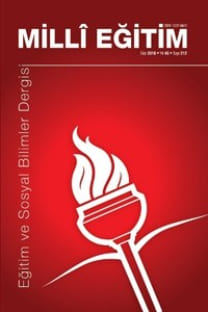YÜRÜTÜCÜ BİLİŞE DAYALI BİREYSEL TUTUMLARIN PİYANO ÇALMA BAŞARISINA ETKİSİ
Piyano eğitiminde bireylerin piyano çalmaya ve çalışmaya olan bakışaçıları, başarı düzeyini etkileyen unsurlardan biridir. Bireylerin piyano çalmayave çalışmaya olan isteksizlikleri yada olumsuz tutumları, başarılı olma yolundaönemli bir engeldir. Bu çalışmada piyano öğrencilerinin, piyano çalgısına olantutumlarının başarı düzeyi üzerindeki etkisi ortaya konulmuştur. Yapılan çalışmada piyano eğitimi alan ve piyanoya karşı olumlu ve olumsuz tutumlar geliştirmiş olan iki öğrencinin başarı düzeyleri, test tekrar test yolu ile belirlenmiştir.Deneme öncesinde değerlendirmeye alınacak olan örneklem grubuna kısa birtutum ölçeği uygulanmış ve elde edilen sonuçlar piyano dersi notları ile karşılaştırılmıştır. Piyano eğitimine yönelik temel bakış açılarını içeren kısa tutumölçeği yardımıyla zıt yönde eğilim gösteren iki öğrenci seçilmiştir. Belirlenenöğrenciler ile farklı iki zamanda test tekrar test yolu ile uygulamalar yapılmış vesonuçlar değerlendirilmiştir. Değerlendirmeler sonucu elde edilen veriler istatistik işlemlerden geçirilmiştir. Yapılan karşılaştırmalı istatistiksel ölçümler neticesinde, piyano eğitiminde kişisel tutumların önemli rol oynadığı belirlenmiştir
EFFECT OF METACOGNITION BASED INDIVIDUAL
ATTITUDES TO PIANO PLAYING SUCCESS
Individual’s approaches to playing and practicing in piano education, is one of the element that effect level of success. Unwillingness and negative attitudes of individuals to the piano playing, is an important impediment over the success. In these study effects of the attitudes of piano students over the level of success in piano education has been studied. In the study, success level of two students taking piano education and have different positive and negative attitudes to piano playing have determined by the test – retest technical. Before the experimental process a short attitude scale has applied to sample group that they take into assessment and achieved results have compared with piano class points taken by the students. Two students that have different attitudes have selected by the short attitude scale contains basic views about piano education. With these determined students experimental applications and evaluations have been made in different time period by test retest strategy. Achieved results at the end of the evaluation process have been achieved from statistically measurement. At the end of the comparative statistically measurements, it has determined that individual attitudes have an important role in piano education.
